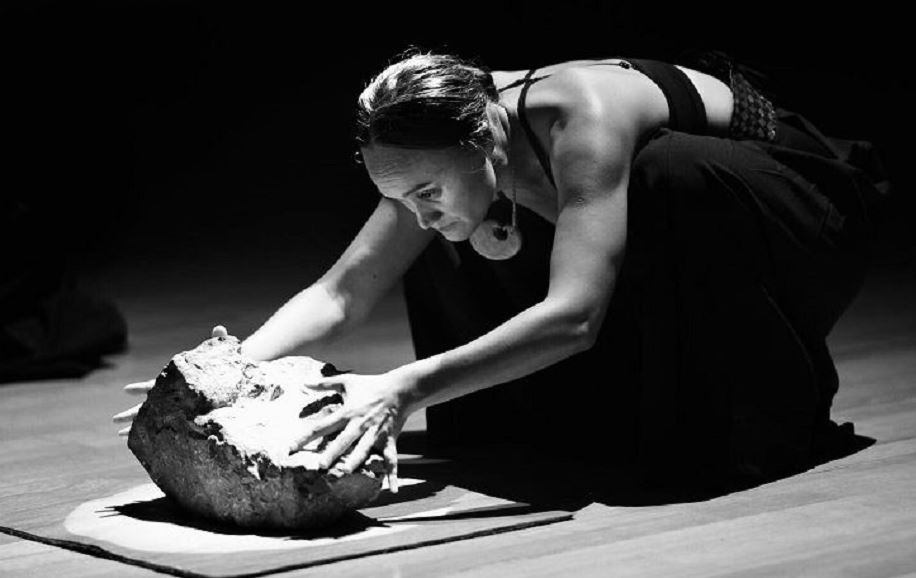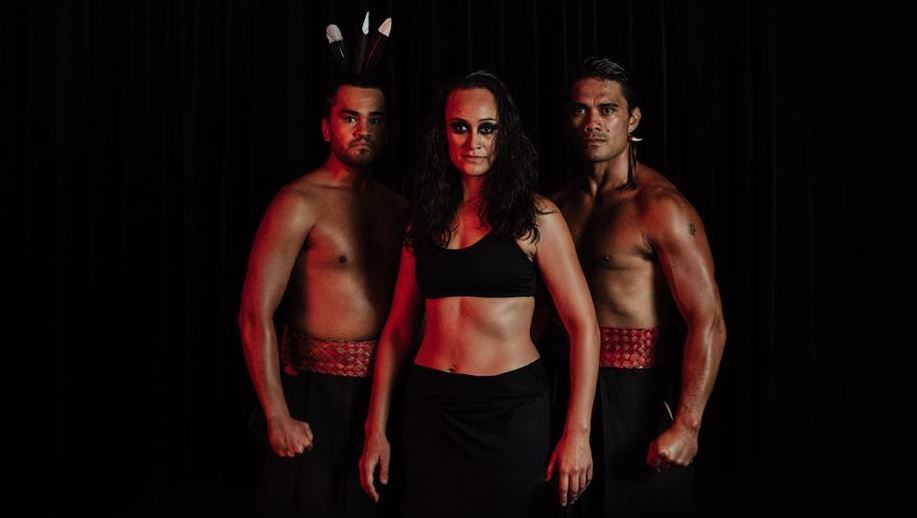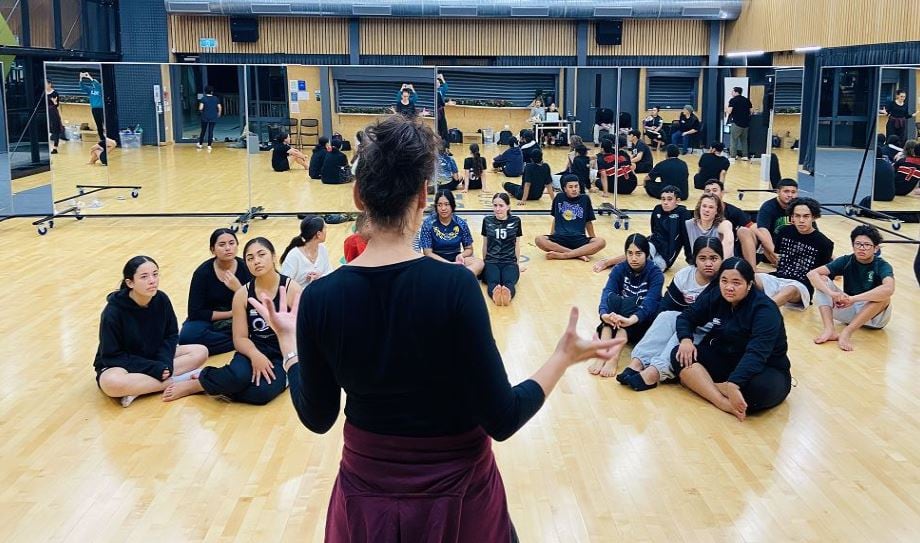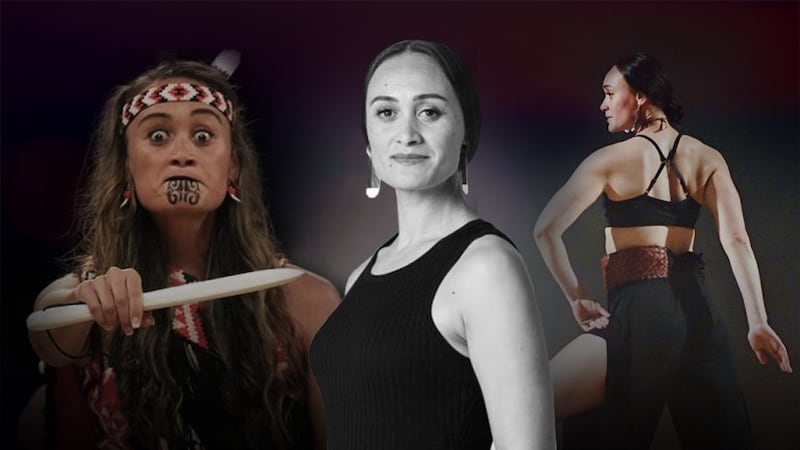Photo credit: Peter Jennings (Auckland Live), Toaki Okana
Kura Te Ua is an all-round performing arts powerhouse. Born and raised in Tāmakai Makaurau, she is the co-founder of the Māori contemporary dance and Māori performance company, Hawaiki TŪ, which celebrates ten years in 2021.
Of Te Rarawa, Te Aupōuri, Te Aitanga a Māhaki, Te Whakatōhea and Tūhoe, Kura attributes much of her interest and success in theatre to her firm roots within mātauranga Māori, specifically kapa haka.
With her knowledge of traditional dance theatre and Māori performing arts, Kura has become a pioneer for an exciting hybrid style of performance – Haka Theatre.
Journey to theatre
Every performer has a journey to the theatre stage. Some begin with the Shakespeare classics, others make the transition from the dance stage, but for Kura her pathway to the theatre was primarily through kapa haka. She says it became an important vehicle in expressing who she is as a Māori. “It became my language."
“Over the years, through the fundamentals, values and teachings within kapa haka specifically with Te Waka Huia, it enabled me to branch out and explore other avenues such as dance and theatre, and to tell our narratives in a way that is unique to us.”

The emergence of Haka Theatre
The term first came to light in 2011 through a production called Arohanui - The Greatest Love led by artistic director Tanemahuta Gray, along with Tapeta and Annette Wehi, Jim Moriarty and Helen Pearse-Otene. Kura was one of the performers in this project and says that it not only ushered in this new genre of theatre but paved the way for mātauranga Māori to be displayed within the mainstream realm.
Having been in the industry for a little over 20 years, Kura has seen for herself the acceptance of Māori performing arts by mainstream audiences and companies alike.
“I’ve been able to bear witness to the changes in which things Māori, or Māori stories and our narratives, are now becoming a normal way of expressing, through mostly haka.”
A prime and recent example of Haka Theatre, was Autaia, an Auckland Live event which brought together three Māori schools in Tāmaki to create a 30-minute haka theatre piece, with the help of mātanga toi Māori.
For Kura, the success of Autaia was measured by the growth experienced by the students and exposing them to performing possibilities outside of haka.
“This was a huge milestone because when I was at school, this is something that I wanted.
“I guess the timeline of Māori performing arts and the expansion of it goes back to the likes of Princess Te Puea, and from there to now where you can perform at kapa haka nationals, from primary all the way up to the senior level, which is just amazing. And then we start to branch out into theatre spaces.”
Taurite
Nowadays, Kura is as busy as ever, balancing the many 'hats' she wears, being a full-time māmā, artistic director and performer for Hawaiki Tū, as well as the Kaiarataki Toi Māori for Auckland Live.
Her latest project is Taurite, developed in partnership with Auckland Live, Taurite wowed audiences in 2020, where it scooped top awards, including 'Pick of the Fringe', 'Best Dance', and Auckland Arts Festival's 'Best of the Fringe'.

Kura and company were only days away from the live performance of Taurite, set with a 3D component, scheduled to premiere on the 1st of September.
“So we were right in the trenches. We had just finished an intense week with Neil Ieremea and we were ready to take things to a whole other level.”
Although those plans were squashed by the current Delta lockdown, Kura is hopeful that Taurite will still go-ahead by the end of this year, and have optimistically planned tours around the motu for next year.
"We really want to just acknowledge our audience and all the support they've given us. Taurite will definitely go ahead, it's just a matter of when."

Kura Te Ua speaking to students from Ngā Puna o Waiōrea. Source / Supplied
Rain, hail, shine or pandemic, nothing can stop Kura’s ambitions within the world of performing arts and the Māori voice she embodies.
Only two weeks shy of her 40th birthday, there is no doubt Kura's legacy is destined for greatness, and with the amount of mahi she does with rangatahi across the motu, it is safe to say the next generation of Māori performers is in safe hands.
:quality(70)/cloudfront-ap-southeast-2.images.arcpublishing.com/whakaatamaori/OX27UC5QYNA6R2UOBLIHSKLTRM.jpg)


:quality(70)/cloudfront-ap-southeast-2.images.arcpublishing.com/whakaatamaori/PJNCSKAUCGO7ER36FLKTJKNBR4.jpg)
:quality(70)/cloudfront-ap-southeast-2.images.arcpublishing.com/whakaatamaori/OX3GXVRL3DPPGOOFV6HOJC7DOQ.jpg)
:quality(70)/cloudfront-ap-southeast-2.images.arcpublishing.com/whakaatamaori/JTV6KTV32U63WTQNN7GGGP66W4.jpg)
:quality(70)/cloudfront-ap-southeast-2.images.arcpublishing.com/whakaatamaori/B4WFDOSJN26AQGUAGM4VHNWUKY.jpg)